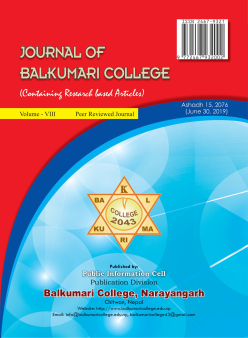Students' Satisfaction towards the Quality of Education between Constituent Campus and Affiliated Campus of Tribhuvan University
DOI:
https://doi.org/10.3126/jbkc.v8i0.29302Keywords:
Higher Education, Students' Satisfaction, Constituent Campus, Affiliated CampusAbstract
Introduction: Worldwide, higher education is an important instrument for the construction of knowledge and development of human skills. Nepal has experienced a tremendous growth of Government, Public and Private Colleges as major contributors in providing higher education over the few decades but are facing rising issues related to lower enrollment and brain drain. Thus, aim of this study was to assess students' satisfaction towards the quality of education between Constituent Campus and Affiliated Campus of Tribhuvan University and determine its' prime domains.
Methodology: Purposively, conducted a quantitative comparative research design study in one Constituent Campus and one Affiliated Campus of Tribh uvan University. Self-administered questionnaire tool, classified into Demographic information and Perception regarding student's satisfaction, were distributed to total 80 students, 40 each from Constituent Campus and Affiliated Campus using purposive sampling technique. Likert scale was used to measure perception of students toward the quality of education. Analyzed data in descriptive and inferential statistical technique using IBM SPSS 25 and AMOS 24 version software.
Results: Satisfaction towards quality of education was highly significant with academic environment β = 1.14, p-value <0.001) followed by physical environment (β =0.73, p-value <0.001), perceived quality education (β =0.63, p-value <0.001) and services provided by different departments (β=0.61, p-value <0.001).
Conclusion: Students' satisfaction towards the quality of education is poor in both Constituent and Affiliated Campus. However, Affiliated Campus students are more satisfied as compare to Constituent campus students. Well maintained classroom, good library facilities, positive attitude of the teaching faculties and appropriate services from departments should be focused for students' satisfaction regarding quality of education.




